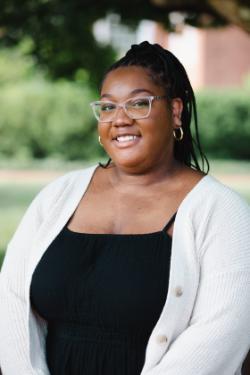
From graduate to advocate
Counseling alum supports BIPOC students at Longwood
When 2022 graduate Tianna Jordan first heard about Longwood University’s Master of Science in Counselor Education, the program’s mission statement struck her. 
“It highlighted their focus on multicultural counseling and social justice, which became even more significant in 2020 following George Floyd’s death,” she said. “It was encouraging to see that the program was actively working to form counselors who would be multiculturally competent and capable of addressing diverse needs throughout their careers.”
Today, having graduated from the Counselor Education, M.S. mental health track in 2022, Jordan serves her graduate alma mater as a counseling resident at Longwood University Counseling and Psychological Services (CAPS). She began this grant-funded position in 2022 after completing a graduate internship at CAPS, during which she conducted individual counseling sessions under the supervision of a senior staff counselor. She credits that unique experience with building a solid foundation in counseling frameworks and skills — from writing better clinical notes to trusting her instincts in a session. One important teaching tool included recording her sessions for supervisor review.
“This approach provides the experience of conducting sessions independently while receiving full support and guidance from supervisors,” Jordan said. “Watching these recordings and receiving feedback from my supervisors has helped me improve in areas such as accepting silence in a session, utilizing more clinical interventions learned in class and understanding the rationale behind those interventions.”
Jordan says that in multiple ways, her internship at CAPS shaped her into the counselor she is today.
“Having such a supportive environment and people who are invested in my growth helped jumpstart my career. This is why I decided to stay [at Longwood] when I was offered the position.”
Ultimately, Jordan’s experiences led her to her current focus — working with black, indigenous and other people of color (BIPOC) and underrepresented students.
“Initially, I had minimal BIPOC clients, but those who were BIPOC shared their experiences with microaggressions,” she said.
Recognizing the need to address these issues from a mental health perspective, Jordan began seeking professional development in racial and generational trauma.
“These negative experiences impacted their well-being, and, as a woman of color, I could relate to these experiences.”
Her professional commitment has led to tangible results at Longwood.
As a member of the team for Graduate Students of Color, today Jordan is working actively to foster an inclusive and empowering academic community. She collaborates with the university’s Office of Multicultural Affairs to provide embedded counseling and conduct outreach. In the spring of 2024, she organized a three-part series on healing racial and generational trauma through somatic psychotherapy. She also plans to launch a support group for BIPOC students in fall 2024 in partnership with Robert Russa Moton Museum Executive Director Cainan Townsend, who is a 2020 graduate of Longwood’s Counselor Education program.
As Jordan actively helps shape the university community, Longwood, in turn, continues to mold her professional journey. Recently, she worked as an adjunct instructor in the psychology department.
“I've always considered being an adjunct professor because I would like to mentor students,” she said. “This experience has made me consider pursuing a doctorate degree to teach in a graduate program.”
The relationships Jordan developed at Longwood have paved the way for these future collaborations — and reframed the way she approaches her own work.
“I also often reflect on a comment Dr. [Kathleen] McCleskey made to our class on the first day of Techniques of Counseling: ‘Be kind to yourself,’” Jordan said. “This advice was invaluable during graduate school, a time when I was balancing being a student, working a full or part-time job, and gaining hours and experience as an intern. It was easy to lose sight of the big picture and experience imposter syndrome, so hearing that advice on the first day was immensely helpful. I still share this phrase with my clients to remind them to be compassionate toward themselves throughout their journeys.”
